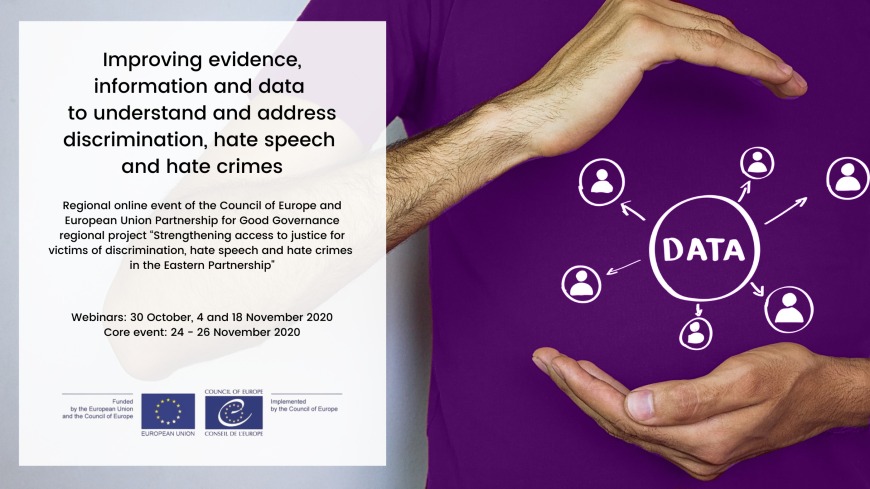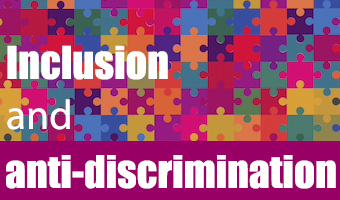The Council of Europe is organising a regional event on data collection which will be comprised of a combination of webinars on 30 October, 4 and 18 November 2020, and an online core event on 24 - 26 November 2020.
Concept note and programme ENGLISH RUSSIAN
More than numbers: the importance of data, research and evidence for combating discrimination, hate speech and hate crimes in the Eastern Partnership countries, a regional review ENGLISH RUSSIAN
Backgound information
Gathering data, information and evidence on discrimination, hate speech and hate crimes is a key step to identify areas of concern and of policy making. Understanding the current and changing prevalence and impact of these harms allows legislators and other decision-makers to assess the effectiveness of existing legislation, policy and practice. It also allows them to better protect victims.
While there is a relatively comprehensive framework of norms and standards to guide national policy makers, and general agreement about the importance of good quality, disaggregated data, procedures vary considerably from country to country, and, within a given country, from institution to institution. In the Eastern Partnership region, the situation is characterised by a limited data, incomplete national legislation, but also good practice by individual institutions. Through recent co-operation, the Council of Europe has supported national stakeholders to take steps to amend their data collection in Armenia, Georgia, the Republic of Moldova and Ukraine.
In this context, this regional event aims to:
- Reaffirm the importance of having data, information and evidence about the experiences of victims of discrimination, hate speech and hate crimes, and the effectiveness of responses
- Offer a forum to explore how data on hate crime, hate speech and discrimination are being captured, analysed and used to effectively combat these phenomena
- Offer examples of practice on disaggregated data collection and on inter-agency co-operation on this matter, from the Eastern Partnership region and beyond
- Share experiences of how hate crime, hate speech and discrimination impact on different communities and to share ideas on how these differences can be captured and reflected in national data collection mechanisms.
- Motivate participating institutions to take steps to improve their data collection methodology and practice.
The methodology of this regional meeting is based on peer learning and networking, and interactive sessions. Participants’ expertise and good practices from the Eastern Partnership region and beyond will also be used during the programme as learning opportunities. The programme will be comprised of a combination of webinars and an online core event, comprising both plenary online sessions and workshops.
Facilitated discussions will explore international concepts of hate crime, hate speech and discrimination, the vital role that high-quality information, evidence and disaggregated data play in understanding and addressing these harms, and the role of various bodies in ensuring progress at the national level. National partners will share insights from their experience of setting up inter-institutional co-operation systems that focus on identifying and taking strategic, coordinating actions. Participants will explore differences in the mandates and practice of Ombudsoffices and Equality bodies in this area and related implications for their own contexts. Sessions will also have a technical focus on the development of working definitions and concepts, recording forms, guidelines, training and other forms of capacity-building, and cooperation with civil society organisations.
The meeting will be substantively informed by a comparative review of how Armenia, Georgia, the Republic of Moldova and Ukraine approach recording and data collection of hate crime, hate speech and discrimination, and the related role of Ombudsoffices/Equality bodies. The findings of the reviews will be distilled in the form of a brochure and include examples of good practice to be shared with participants.
Profile of participants
The regional event will involve participants from Armenia, Georgia, Republic of Moldova, and Ukraine. Participants will include representatives from Equality body/Ombudsoffice, police and prosecution services, courts, representatives from relevant government ministries and national statistical bodies as well as NGOs that are active in the area of recording, monitoring and victim support.
Event Programme
- WEBINARS
Webinar 1 – 30 October 09.00 - 10.30 CET Using data for combating discrimination, hate speech and hate crimes
This session will have two parts. First, the overarching concepts, norms and standards on why collecting evidence, information and data on hate crime, hate speech and discrimination is important will be reviewed. Second, a national example of implementing these norms and standards will be shared from the Observatory for Security against Acts of Discrimination (OSCAD) located in the Ministry of Interior, Italy.
Watch the webinar
Joanna Perry's presentation
Stefano Chirico's presentation
Webinar 2 – 4 November 09.00 - 10.30 CET Stories behind the numbers: How to focus on victims in data collection on discrimination, hate speech and hate crimes?
This session will explore the impact of discrimination, hate speech and hate crimes on individuals and communities and the relevance of data collection for purposes of advocacy and victim/community support. The webinar will focus on experiences of different organisations and institutions, focusing on how they collect data putting the victims at the core of their interventions.
Watch the webinar
ACCEPT Association's presentation
Webinar 3 – 18 November 09.00 - 10.30 CET The next frontier of data, using algorithms to understand and govern responses to hate speech online
This webinar showcases projects that use hate speech data to offer responses to the problem. The session will include presentations of projects that use online hate speech data and how the interventions from the law enforcement were coordinated and based on this data.
Watch the webinar
Paul Giannasi's presentation
- REGIONAL CORE EVENT
DAY 1 – 24 November, 8.00 - 11.00 CET
Official opening by the Anti-discrimination Department and DG NEAR(tbc)
General introduction to the event
Workshops on:
- Police data recording practice on hate crime: what information should be captured and how should it be used?
Watch the plenary and the workshop 1
Presentation by Irish Police
- Data collection by equality bodies/ Ombudsoffices
Watch the workshop 2
Croatian Ombudsperson
- Data collection experiences of civil society organisations
Watch the workshop 3
Promo LEX Moldova
RVRN Greece
DAY 2 – 25 November, 8.00 - 11.00 CET
Experiences of inter-agency co-operation on data collection: Georgia GPO
National group discussion on how to harmonise data collection on discrimination, hate speech and hate crimes
Watch day 2
DAY 3 – 26 November, 8.00 - 10.00 CET
Panel discussion with international institutions and monitoring bodies working on collecting data from the national level: how to improve data collection (involving ECRI, FRA, ODIHR, CERD, and possibly DG NEAR / DG JUST (tbc))
Watch day 3
Presentations : ECRI ODIHR
Closing of the event
This event is organised in the framework of the project “Strengthening access to justice through non-judicial redress mechanisms for victims of discrimination, hate crime and hate speech in Eastern Partnership countries. This project is part of the Partnership for Good Governance Programme. Funded by the EU and implemented by the Council of Europe, the programme aims to strengthen governance in the Eastern Partnership region.




